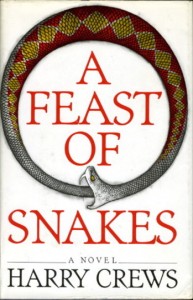
Harry Crews’s A Feast of Snakes has been a pivotal book for me as both reader and writer. I grew up in the South and I grew up on southern literature, and before encountering Crews, I’d been unable to see past the charms of Faulkner. I’d been unable, in fact, to see past the charms of just about anything written after the 1950s and ’60s. Late 20th-century fiction didn’t resonate. Not until Feast of Snakes—and then every Crews book I could get my hands on (most are, or were, out of print)—was I able to appreciate stories that addressed the world I was living in. (The irony is not lost on me that it took a book written in the ’70s for me to begin to understand and be open to writing that was taking place in the ’90s.)
I don’t think about Crews every day, or even every week, but I think of him and this particular novel often. From Crews I learned the difference between pornography for pornography’s sake (the bad kind, as John Gardner would have it) and sex and grit for the sake of art and honesty. As I write this, it occurs to me that it’s because of Crews that I am not a total prig.
Last summer, after years of trying, I finally convinced my husband to read Snakes. He’d been resistant in the way that anyone might be to someone who is overly enthusiastic. He acquiesced, I suspect, in part because of a discovery we made when he took the book down from our shelves: in 1976, along with Joseph Heller and Norman Mailer, Douglas Day (my husband’s grandfather) blurbed the novel, referring to Crews’s work as “a kind of radical sadness.” This strikes me as profoundly correct.
Here’s how good the book is: for three days I watched my husband read it, and for three days I watched him agonize over its story—a thrilling experience that reminded me of my own introduction to the book and that filled me with no small amount of envy. There were times when he’d put it down, walk away, say, “I can’t. It’s too much,” only to return to it five minutes later. “I have to,” he’d say. “I have to.”
And that’s just it. To anyone who hasn’t, you have to; you have to read this book. Utterly devastating in its honesty and intensity, it’s about as good as fiction gets.


